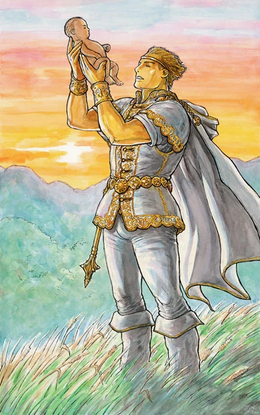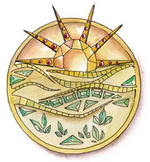Lathander: Difference between revisions
| (One intermediate revision by the same user not shown) | |||
| Line 38: | Line 38: | ||
== Relationships == | == Relationships == | ||
Lathander and Chauntea have been romantically connected for centuries and see each other as kindred spirits. His allies include [[Gond]], [[Tymora]], [[Tyr]], [[Torm]], [[Ilmater]], [[Sune]], [[Selûne]], [[Oghma]], [[Kelemvor]], and [[Mielikki]]. His foes were [[Cyric]], [[Talos]], and [[Shar]]. [[Helm]] held a great deal of resentment for Lathander, as the latter indirectly caused the death of Helm's lover, [[Murdane]]. | Lathander and [[Chauntea]] have been romantically connected for centuries and see each other as kindred spirits. His allies include [[Gond]], [[Tymora]], [[Tyr]], [[Torm]], [[Ilmater]], [[Sune]], [[Selûne]], [[Oghma]], [[Kelemvor]], and [[Mielikki]]. His foes were [[Cyric]], [[Talos]], and [[Shar]]. [[Helm]] held a great deal of resentment for Lathander, as the latter indirectly caused the death of Helm's lover, [[Murdane]]. | ||
== Worshipers == | == Worshipers == | ||
| Line 59: | Line 59: | ||
In 1396 DR, [[Grant Hobbes]], an advisor to Crown Prince [[Rodryck Dolan]], convinced the Crown Prince to adopt the [[Church of Pelor]] as the state religion of the [[Kingdom of Men]]. After Dolan's coronation at [[Chaythorp Tower]], the central cathedral to Pelor, temples to Lathander all over the Kingdom were converted to Pelor and Lathanderites were persecuted. Prayers to the Morninglord all but ceased and the god lost so much power he all but vanished. | In 1396 DR, [[Grant Hobbes]], an advisor to Crown Prince [[Rodryck Dolan]], convinced the Crown Prince to adopt the [[Church of Pelor]] as the state religion of the [[Kingdom of Men]]. After Dolan's coronation at [[Chaythorp Tower]], the central cathedral to Pelor, temples to Lathander all over the Kingdom were converted to Pelor and Lathanderites were persecuted. Prayers to the Morninglord all but ceased and the god lost so much power he all but vanished. | ||
In Hammer 1492 DR, [[Sette Valentyne]] discovered a pocket of Lathanderians in [[Symonia]] and after speaking with the Morninglord himself in a dream, she began proselytizing on his behalf during her travels. The largest effort in this was made when Sette made | In Hammer 1492 DR, [[Sette Valentyne]] discovered a pocket of Lathanderians in [[Symonia]] and after speaking with the Morninglord himself in a dream, she began proselytizing on his behalf during her travels. The largest effort in this was made when, in Flamerule 1492, Sette made Vilyanna Amastacia cleric of the temple at Fort Gerdar. At that time, the area around the fort had become a refugee camp of sorts and Vilyanna's sermons of a god of new beginnings were well received over the next few months. | ||
On 6 Eleint 1492 DR, the [[Dawn Guard]] freed [[Thayen]], aasimon of Lathander, who had been imprisoned and was serving as the source of power for the Church of Pelor. This freeing caused the clerics of the church to lose their power and began a shift toward the worship of other gods including Lathander. | On 6 Eleint 1492 DR, the [[Dawn Guard]] freed [[Thayen]], aasimon of Lathander, who had been imprisoned and was serving as the source of power for the Church of Pelor. This freeing caused the clerics of the church to lose their power and began a shift toward the worship of other gods including Lathander. | ||
Latest revision as of 04:27, 6 October 2024
| Lathander | |
|---|---|

| |
| Deity | |
| Titles | Morninglord Bringer of the Dawn Inspiration's Dawn The Rose-and-Gold God |
| Adjectives | Lathanderian Lathanderite |
| Alignment | Neutral Good |
| Symbol | Road traveling into a sunrise |
| Domains | Life, Light |
Lathander (pronounced lah-THÆN-der) is a god with a vast portfolio including birth, renewal, spring, and youth as well as athletics, self-perfection, vitality, and creativity. The Morninglord is symbolized by the rising sun, but rather than being the god of the sun itself, he is the god of the dawn.
Description
During his numerous visits to the Great Mother's Garden, Lathander appeared as a giant of a man, to match the size of his lover, Chauntea. His visage radiated bright shine of the morning sun and his hair burned with flaming orange-red fire. Lathander appeared as a handsome young slender muscled human man. His preferred clothes were a set of colorful robes of reds, pinks, and yellows. A red and golden sash embraced the god's waist. He wore golden sandals and left scorch marks everywhere his feet touched the ground. Lathander often floated and liked to materialize in a glorious spectacle of dawn sun beams. His radiant face darkened akin to solar eclipse when the god was angered or upset.
Personality
Lathander is an eternal optimist with a constant willingness to focus on hopes for the future rather than wallow in the failures of the present. He is a doggedly determined god who encourages proactive altruism and constant reevaluation of the old ways. Exuberant and friendly, his interests lie in vibrant life (regarding both birth and nature) and conversely urged the destruction of the corrupted mockeries of life, such as the undead.
Relationships
Lathander and Chauntea have been romantically connected for centuries and see each other as kindred spirits. His allies include Gond, Tymora, Tyr, Torm, Ilmater, Sune, Selûne, Oghma, Kelemvor, and Mielikki. His foes were Cyric, Talos, and Shar. Helm held a great deal of resentment for Lathander, as the latter indirectly caused the death of Helm's lover, Murdane.
Worshipers

"I shall let all who dwell in dark feel your holy dawn, Morninglord. Hear my prayer." ― A basic prayer to Lathander
Novices in the Lathanderian faith were called the Awakened, while clerics were known as Dawnbringers. The full priests took a new name in his service when they were ready to signify that Lathander personally recognized and accepted them. This new name could either be used instead of their old name or simply used only when addressing other Dawnbringers and when in solitary prayer. Titles used by Dawnbringers (in ascending order) were: Dawngreeter, Dawnlord, High Dawnlord, Dawnmaster, Morninglord, High Morninglord, Mornmaster, High Mornmaster, and Sunrise Lord. Specialty priests were also known as morninglords. All followers were required to be of neutral to good alignment.
All of Lathander's clergy respected art, liberty, nature, and culture; promoted betterment of oneself; and strove to bring hope to their followers and others. Many of these followers worked in various creative arts. They were intolerant of evil, especially undead and inaction that caused evil to prosper. Most ceremonies of Lathander were held at dawn and actions and contracts agreed to at sunrise were said to be blessed by him. Funerals, among his followers, were held at dusk, and followed by a wake that lasted until dawn.
Temples
- Fort Gerdar: Originally established by Sette Valentyne, the temple was taken over by Vilyanna Amastacia who began evangelizing and rapidly expanding.
- Symonia: The oldest temple of Lathander in Omelon.
History
In 1396 DR, Grant Hobbes, an advisor to Crown Prince Rodryck Dolan, convinced the Crown Prince to adopt the Church of Pelor as the state religion of the Kingdom of Men. After Dolan's coronation at Chaythorp Tower, the central cathedral to Pelor, temples to Lathander all over the Kingdom were converted to Pelor and Lathanderites were persecuted. Prayers to the Morninglord all but ceased and the god lost so much power he all but vanished.
In Hammer 1492 DR, Sette Valentyne discovered a pocket of Lathanderians in Symonia and after speaking with the Morninglord himself in a dream, she began proselytizing on his behalf during her travels. The largest effort in this was made when, in Flamerule 1492, Sette made Vilyanna Amastacia cleric of the temple at Fort Gerdar. At that time, the area around the fort had become a refugee camp of sorts and Vilyanna's sermons of a god of new beginnings were well received over the next few months.
On 6 Eleint 1492 DR, the Dawn Guard freed Thayen, aasimon of Lathander, who had been imprisoned and was serving as the source of power for the Church of Pelor. This freeing caused the clerics of the church to lose their power and began a shift toward the worship of other gods including Lathander.